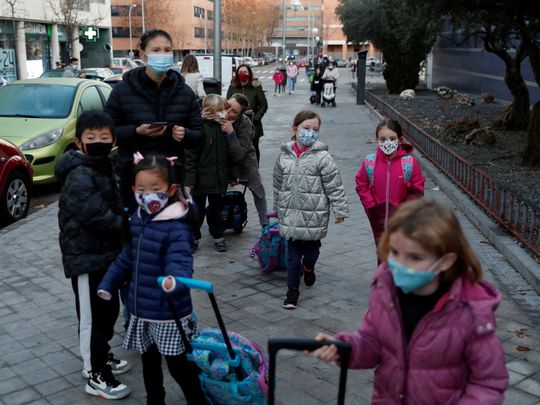
Copenhagen: More than half of people in Europe are on track to contract the Omicron COVID-19 variant in the next two months if infections continue at current rates, the World Health Organisation said Tuesday.
Speaking at a press conference, regional director Hans Kluge warned that the Omicron variant represented a “new west-to-east tidal wave sweeping across” the European region.
“At this rate, the Institute for Health Metrics and Evaluation (IHME) forecasts that more than 50 percent of the population in the region will be infected with Omicron in the next six to eight weeks,” Kluge told reporters.
The WHO’s European region comprises 53 countries and territories including several in Central Asia, and Kluge noted that 50 of them had confirmed cases of the Omicron variant.
According to the WHO, 26 of those countries reported that over one per cent of their populations were “catching COVID-19 each week,” as of January 10.
Referencing data collected over the last few weeks, Kluge said the variant was confirmed to be more transmissible and “the mutations it has enable it to adhere to human cells more easily, and it can infect even those who have been previously infected or vaccinated.”
However, Kluge also stressed that “approved vaccines do continue to provide good protection against severe disease and death, including for Omicron.”
Kluge also said there were more than 7 million new cases of Omicron across Europe in the first week of January, more than doubling in just two weeks.
Kluge said that 26 countries in its region reported that more than 1% of their populations are being infected with COVID-19 each week, warning there is now a “closing window of opportunity” for countries to prevent their health systems from being overwhelmed.
Kluge called for countries to mandate the use of masks indoors and to prioritize vaccination, including booster doses, of at-risk populations, including health workers and older people. WHO’s Geneva headquarters has previously pleaded with rich countries not to offer booster doses and to donate them instead to poorer countries where vulnerable groups have yet to be immunized.
Kluge said he was greatly concerned that as Omicron moves east across the European continent, the variant will take a much higher toll on countries with lower vaccination coverage rates. In Denmark, he noted the coronavirus hospitalization rate was six times higher in people who weren’t vaccinated compared to those who had been immunized.











